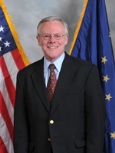The legislative session begins in Juneau today (Tuesday), with a lot on the plate of lawmakers. Casey Kelly spoke with Juneau Senator Dennis Egan and has this preview.

Juneau Senator Dennis Egan is feeling good heading into the 2012 legislative session.
He’s in the second year of his first full term, after being appointed to the seat on the last day of the 2009 session. More importantly, Egan starts off the year with a clean bill of health, after undergoing heart surgery just two and a half months before the start of last year’s session.
“I didn’t have a medical procedure this year,” says Egan. “I feel great.”
In addition, Egan is the only Senator who won’t have to run for re-election this fall due to redistricting, or the redrawing of legislative boundaries every 10 years according to the U.S. Census.
Under the Alaska Redistricting Board Plan, Egan won’t run again until 2014, though next year his district will pick up several new communities, including Skagway and Petersburg. Egan says the extra time will help him to get to know those communities a little better, but he doesn’t expect it to change the way he serves.
“I’ve always represented Southeast, and people from those communities have always come in to our office, and we’ve worked very hard in trying to get their issues resolved, and their requests for capital projects and issues that directly affect their communities,” he says.
Egan is squarely in the middle of the biggest issue facing the Senate this year: The governor’s proposal to cut taxes on oil companies. The bill ended last session in the Senate Labor & Commerce Committee, which Egan chairs. During the interim the committee held four days of hearings on the bill in Anchorage and Fairbanks. Egan says the Senate still has concerns about the lack of Alaskans employed on the North Slope.
“The people own the resource,” says Egan. “And we as a Senate Bipartisan Working Group think that we should get something in return. We’re not opposed to providing some kind of an incentive for the industry. But we need something in return.”
To get a better handle on employment in the oil industry, the Senate hired Juneau-based McDowell Group to do a study. Egan expects the analysis to get at least one hearing early in the session.
“It shows there is a lot of non-resident hire, and we want to address that issue,” he says.
Egan is one of six co-sponsors of a bill that would exempt a proposed natural gas pipeline from property taxes during construction. He says the idea came from discussions Senators had with the industry.
“Trying to reach some sort of a conclusion to providing an incentive for industry and Alaskans to increase our portfolio,” Egan says.
Another bill Egan worked on during the interim would give public employees the option of choosing either a defined benefit or defined contribution retirement plan. Alaska was the first state to do away with a traditional pension, or defined benefit for state workers. Since 2006, all new hires have been set up with a defined contribution plan, similar to a 401(k) savings account.
Egan’s bill has 10 co-sponsors – including two Republicans – who feel the defined benefit is a better deal for Alaska’s retired public employees, because it guarantees them a pension check every month.
Egan’s office is currently trying to get the Parnell administration to agree on a cost estimate for the bill. The administration’s actuary says it would cost the state more to offer a defined benefit option. Unions and other backers of the bill hired their own actuary, who says it would not increase costs. At a hearing during the interim the two actuaries were asked to work together to settle the discrepancy.
“We’re trying to make it as close to revenue neutral as we can,” Egan says. “We want people to retire in Alaska, and I think Senate Bill 121 allows those folks to do that.”
Egan says he’s happy with Juneau projects in Governor Parnell’s proposed capital budget, especially ongoing funding for the State Library Archives and Museum, or SLAM project, as well as renovations or repairs to the Douglas Island Office Building, the State Office Building parking garage, and the Juneau Pioneer Home.
He says other priorities for the Senate Bipartisan Coalition will be affordable energy, expanding Alaska’s infrastructure and pre-kindergarten through post-secondary education.
